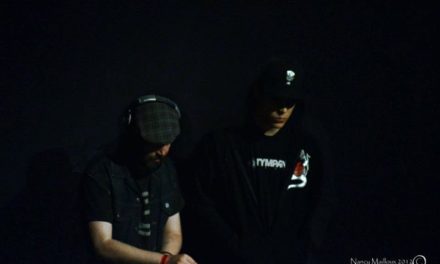We don’t often do straight opinion pieces, but we had a deadline and this is something we’ve been thinking on for a while. Read up and let us know what you think in the comments!
We had a sneaking suspicion at the beginning of the 2013 that this might be the year Our Thing broke back into the general indie consciousness, and thus far we’ve been pretty pleased by how that’s been working out. From the general excitement surrounding the Nails reunion, to Puppy being big-upped by Grimes (an undoubted factor in the greater surge of interest in their latest album compared to the last two) to artists we cover showing up on Hype Machine in greater numbers than ever, it’s been a pretty fascinating trend to watch develop. Even the fact that the word “industrial” got used in practically every review of Kanye West’s Yeezus, whether justified or not, is indicative of some acknowledgment from an indie press that has largely ignored our corner of the swimming pool for aeons. All that stuff is well and good, but perhaps the most interesting thing has been the continued rise of interest in the so-called “indie industrial” or “new body” or whatever term is sticking to it right now. While White Car set the precedent with the interest shown for their debut LP last year, Youth Code are breaking through in a way we never could have foreseen, with articles hyping their debut single and LP appearing on such venerated independent online music journals as Brooklyn Vegan, Ad Hoc and of course, the omnipresent Pitchfork.
Perhaps unsurprisingly, we’ve noticed a lot of reactionary antagonism to this sort of buzz within the “traditional” industrial community, the sort which our pals at Storming The Base so cannily addressed recently. When a band dealing with influences you, the savvy long-time industrial fan are extremely (and perhaps dangerously) well-versed in starts earning plaudits for being utterly ground-breaking and without precedent by people responsible for dreck like this, it’s understandable that shields would fly up as if a Romulan Warbird just decloaked. In addition to your own frustration about the possibility for inept or misleading representation of something that you’ve lived and breathed for decades, there’s the suspicion that the so-called indie press are treating Our Thing like a fad and will drop it the moment chillwave gets a second look or there’s an umpteenth Pavement reunion. Conversely, we can understand why someone might not want the stigma of being associated with the modern-day industrial scene; a search for “industrial song” on Youtube yields Eisenfunk’s “Pong” as the first result, the anthem of the reviled cyber-goth movement, Our Thing’s equivalent of the hated Juggalo.
We sympathize with all of these grievances and have felt them ourselves, but it’s important to realise that they’re all dependent upon a false binary, an “Us and Them” myth which we’ve likely contributed to in no small way by our adherence to the concept of “Our Thing”. Broadly, it invokes an idea of a “traditional” industrial community, the one that encompasses the international club and festival scene and the rivet record labels: the scene that gave us American coldwave, futurepop, and aggrotech (along with yarn hair, gas masks and goofity-ass body armour). Then there are the supposed outsider bands, the bands presaged by ultra-hip fashion label/tastemaker blog Mishka’s support of //TENSE//; bands like White Car, Youth Code, and BITES that have a clear debt to eighties EBM but have largely eschewed the aesthetics of the trad-rivet scene. Some folks would have you believe these communities are at best wary of one another, at worst outright contemptuous. The truth – as always – is a lot more complicated.
It’s easy to draw up arbitrary cartographies, designating one of these movements as the “real” industrial and another as tacky dilettantism, (or coversely one as a return to the spirit of the movement while another is utterly inbred and stunted, the result of a stagnated gene pool) but the harsh reality is that most of the celebrated greats of industrial, new or old, have rejected the “industrial” label and all of its associations at one point or another. As we’ve opined while engaging in this discussion elsewhere, that rejection may in fact be the sole connective tissue between the entirety of the body of industrial artists (talk about negative dialectics). Hell, looking ninety years back into the history of experimental music we have Schoenberg poo-pooing the fusion of traditional harmonic patterns and serialism by his disciple Berg. In short, there is nothing new about the confusion and suspicion over who is releasing “this music” right now and why.
Furthermore, the divisions between the two camps are almost entirely fictional, based on the context in which we are accustomed to seeing this music addressed. A closer examination sees any actual separation falling to pieces, the result of excessive hand-wringing and knee-jerking. Aesthetic Perfection, a top tier act on the industrial touring circuit, is putting out a single at the end of this month with remixes from BITES and ∆AIMON alongside BlakOpz and Suicide Commando. At Los Angeles’ ultra-hip Lil Death hip kids are dancing to southern rap and Laibach in the same set, while not far off, Complex and Part-Time Punks are putting on shows with bills where mainstays like Dirk Ivens play on a bills with up-and-comers like High Functioning Flesh and Blush Response. On the surface a band like Necro Facility and a band like By Any Means Necessary might not have a lot in common, but you can bet there’s more than a little overlap in their shared influences. We don’t think this is a case of two camps working together, we explicltly believe that there are no camps.
Instead of rehashing these same old imaginary divisions, why not work at something more constructive, like a better understanding of a nodular, and unapologetically labyrinthine shared tradition? Do you think Demdike Stare sounds like In Slaughter Natives or that Dom Fernow owes a lot to Bryn Jones? You’re not wrong, but why not point newer listeners of those sounds to some of their progenitors without (and this is the tricky part) sounding like a bitter, wizened asshole? We have a chance to give classic artists like that some shine, as well as direct people from well outside the scene to the sort of contemporary artists we wished they knew about or thought about in relation to Our Thing, rather than just filling in the blank in their mind with whatever 20 year old stereotypes their media diet has fed them.
All of the above has been proposed with the notion that the ears and tastes of you, the cultured and very serious rivethead, are beyond reproach, which, let’s face it, probably aren’t (please realise that this is directed as much at ourselves as it is anyone else). There may be things some of those critics and new ears are detecting which you aren’t. Just about every time we’ve gone absolutely bugfuck for a new record, there’s been someone saying “I don’t see what all the fuss is about; new band X sounds just like old band Y”. Obviously we’ve felt differently and have tried (in our own meager way) to petition for what it is that makes these new bands different or otherwise worthy of attention. There have been splits between the two of us along those lines; one just not initially getting what the other heard right off the bat, or one having to wait for the same listening conditions which cinched one record for the other. There is always room for debate, room for discussion, room for discovering a new record or a new perspective, and perhaps, against all odds, room for admitting past faults.
For all of this, though, for all of the sturm und drang which kicks off this sort of conversation every time new blood comes in, the production of music itself isn’t ultimately dependent upon or threatened by these debates and discussions. At the end of the day, the future of industrial music lies with those creating it, and those people deserve and will have the final say. The attention of the press, whether the ‘fork or ID:UD, provides a record of contemporary attitudes, but doesn’t have authoritative control over the medium or the music. Is some online douche insisting you prove that you’re as rivet as they claim to be before they’ll deign to listen to the demo you posted in good faith? Fuck ’em. Are you depressed by the unwavering certainty that larger press organs will utterly ignore the frigging amazing classic dark electro record you just poured three years of love and work into? Fuck ’em. As an actual artist, you get to decide where this music goes and what it evolves into, for better or worse, not pundits like us.
The future of industrial rests with Youth Code. It also rests with Encephalon. It rests with ∆AIMON, Henrikk Björkk, Everything Goes Cold, Tannhäuser Gate, iVardensphere, High-Functioning Flesh, The Pain Machinery, and countless others. It rests with a lot of artists we think are terrible, too. It rests with kids all over the world who are installing their first DAW or realizing just how much noise they can make with the knobs on their parents’ distortion pedals. If the idea of it resting with all these artists and more either excites or disgusts you, if you want a measure of control, all you have to do is take it. Get in the game.






Excellent article! as an aging experiemental/industrial/electronic geek i’ve learned to appreciate a lot of the newer acts that may be considered on the border, or to some, copycats. I’ve tried pushing some of these on other friends but they seem too entrenched in the past, either it’s a case of “well they’re -okay- but they sound like they’re trying to be too much like so-and-so or this-and-that” or the old fallback “today’s scene/music sucks!” and won’t budge, like the only good industrial came out in the ’80s/’90s and anything after that is prefabricated copycat shite…. ah well… anyway, kudos 🙂
@ David Attic – I couldn’t agree more with everything you’ve stated here. A lot of modern industrial has grown stale to me because all of the bands using the exact same VST’s, etc… I’m sorry but we don’t need another band that sounds like Hocico. Seriously, enough already. People may say that a lot of the newer crop of Indie / Minimal Industrial and Electro acts out there sound like stuff from the 80’s or are a copycat of the old school, but I have the utmost respect for many of these new acts for taking it back to the DIY mentality; and using hardware for a lot of their music creation. They’re taking it back to where it began, but making it new again. And I hope that more of the new acts coming out, will continue to look to this genre’s roots; to find their own identity. Because, I believe that somewhere along the way we lost that.
Kudos to ID:UD for a great article. This is one of the best reads I’ve enjoyed in a long time!!
Preach it! I also wonder if the internet has changed this. Maybe not. And you could make a lot of solid arguments as to why it hasn’t.
But for me, I think it’s exhausting to try and cultivate a coherent set of musical tastes when being bombarded by so much new music. Blogs like this have a big part in that. I love it, but there’s *so much*. I can’t try to build a coherent narrative of what the industrial “scene” is because I don’t know what that even means. By the time I think I have a grip, all these categories have been imploded or proven to be illusory. The best I can do is pluck out what sounds good to me, you know? The artists will make the music, and the listeners don’t need any more-rivet-than-thou gatekeepers to determine what should or should not be listened to.
<3 As Siouxsie sang, "So many critics / So few writing / na-na-na-na / ha-na-na-na"
I recognize that it’s a very petty point, but I do take some issue, journalistically speaking, with the unfounded assertion that Grimes was “an undoubted factor in the greater surge of interest in their (skinny puppy) latest album.” Based on what, exactly? It’s a cute idea, sure, but nothing more — hardly an ‘undoubted factor.’ Have you really been exposed to masses of kids saying or writing “I just discovered skinny puppy through my love of Grimes.’ I’m guessing you haven’t. Puppy have a long legacy that can certainly manage by itself to result in explosive buzz around a quality new release (and one that was far more accessible than the previous two) with our without shout-outs from a hip canadian chick who makes laptop music. Weapon’s hype might be due in large part to hard work by Metropolis, or due simply to unquantifiable scene-Zeitgeist mojo that is impossible to track, or hell, maybe Grimes did make a difference (though again, if so, where are the voices of these brand new SP fans who got here by way of Grimes?) — the point is, I think that as journalists it’s very murky ground when you say “X undoubtedly counted strongly for Y” without anything meaningful to back it up. That said, peace and keep up the interesting articles!
Fair point. It’s an opinion piece, we were writing from our observed perspective rather than from any literal or factual standpoint and “undoubtedly” might not have been the best choice of words given that. Still, I do personally believe that a cosign from Grimes (who is massively, massively popular) and the sudden “Holy Shit, Puppy are back!” interest in Weapon aren’t coincidences.
i gave up on bands that tried to sound like industrial bands and gravitated more towards people who understood the concept and expanded on it. richard devine, represented everything that industrial was to me and made incredibly intricate machine sound sculptures, people didnt call it industrial at the time because it didnt sound like a cliche’d version of the past, but songs like lens align are everything that scene wanted to be in the mid eighties. just done with todays tools. that was ten years ago, and now it seems like people are more interested in reaching back in time than looking forward. such a shame. what people called idm back then has already become a caricature of itself and its a good ten years off from a complete revival (which will suck as much as every revival does) but i really hope the trend breaks soon where people have to make songs that sound dated to get noticed. not that long ago you could still hear the future, i thought that was at least part of what industrial was about.
You seem to dismiss the argument that Kanye West’s album is industrial. You mentioned it was brought up in almost every review of it “whether justified or not.”
Do you think it’s justified?
I just went back and watched his performance of “Black Skinhead” on SNL and read about the album a bit. It was the result of him being cooped up in Paris and studying lots of brutalist architecture. What’s more industrial than that? HIt’s more alienating and provocative than most of the industrial music shows I’ve been to recently. It sounds more like early industrial music than a lot of music I hear on this blog, as much as I love the music you guys post here.
A few points
a) Yeezus absolutely drips industrial influence. I think the ID:UD crew were distracted by the admittedly distressing presence of Kanye West’s sweet and sour sauce vocals.
b) Calling Grimes laptop music on a forum devoted to electroindustrial music makes as much sense as describing coil as gong music. Yes there is a laptop involved.
I believe there’s an argument to be made for “Yeezus” as industrial. However I don’t think the vast majority of the people who used that term in their reviews were doing so, they were using it as lazy shorthand for “harsh and electronic”. I think it’s critically lazy, hence my irritation with it. It’s not so much about the record, as it is about our distaste for lazy writing.
One of the ironies of recent music history is that industrial became irrelevant to mainstream indie music towards the end of the 90s, due in part to its perception of becoming an overwraught, self-obsessed caricature of itself (the fragile?). How things might have been perceived and developed differently if something like the day the world went away appeared after 9/11. Instead the ferocity drained out of the scene, and we were left with the earnest but impotent import of futurepop.
In any case, I think part of the return to the early 80s aesthetic and sound is the resonance with the darker cast of that time, relative to the relatively peaceful and prosperous 90s (in north america at least). A key piece that has been missing from the whole cybergoth thing is the mystery, the weirdness and subsurface sense of doom exemplified by say, early David Cronenberg. Listening to White Car one gets the sense of something moving underneath, something _developing_. I don’t get the same vibe from Youth Code, whose sound would not be entirely out-of-place next to mid-90s leatherstrip.
Another piece is that the aesthetic of the scene has become so insular, so predictable and silly, I think it is detrimental to gaining outside attention. Industrial concert? Everyone in black combichrist, solutions for a small planet, or (extra points!) klinik t-shirts , combat boots, check. It’s all so boring.
My Opinion is that Grimes and kanye west are just artist pushed buy big business that will fall out od style once the next big thing comes along. and alot thank to all the new industrials bands for making this music fresh again yc, hff ,wc,, b.a.m.n, //T//, Props to oldschool and new school
Um no. Geidi Primes.